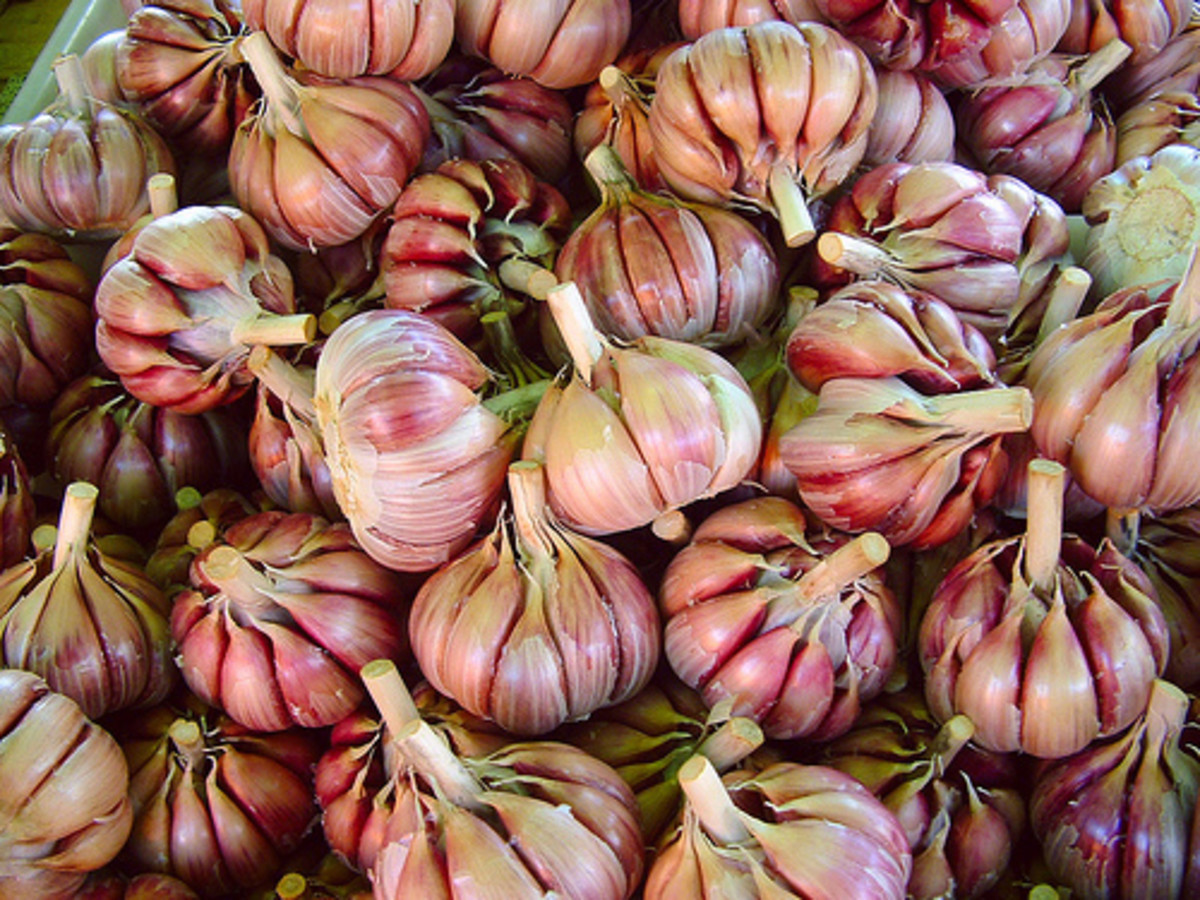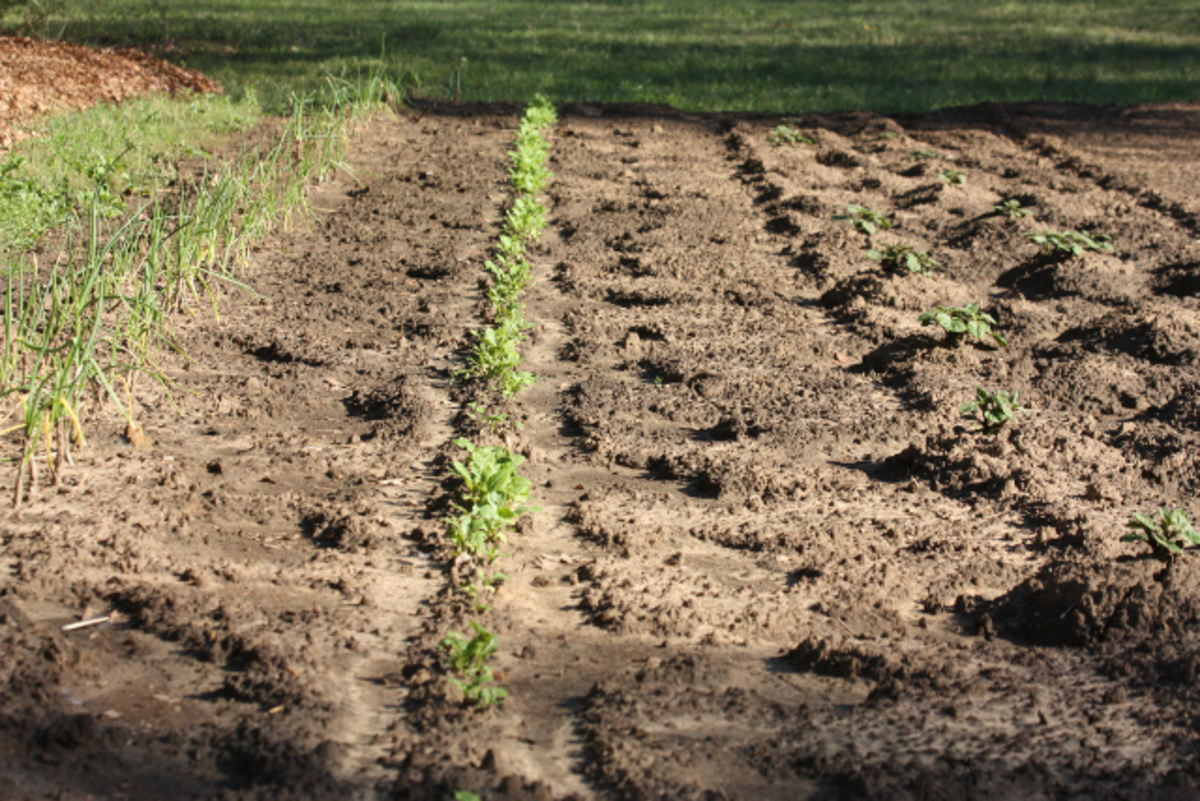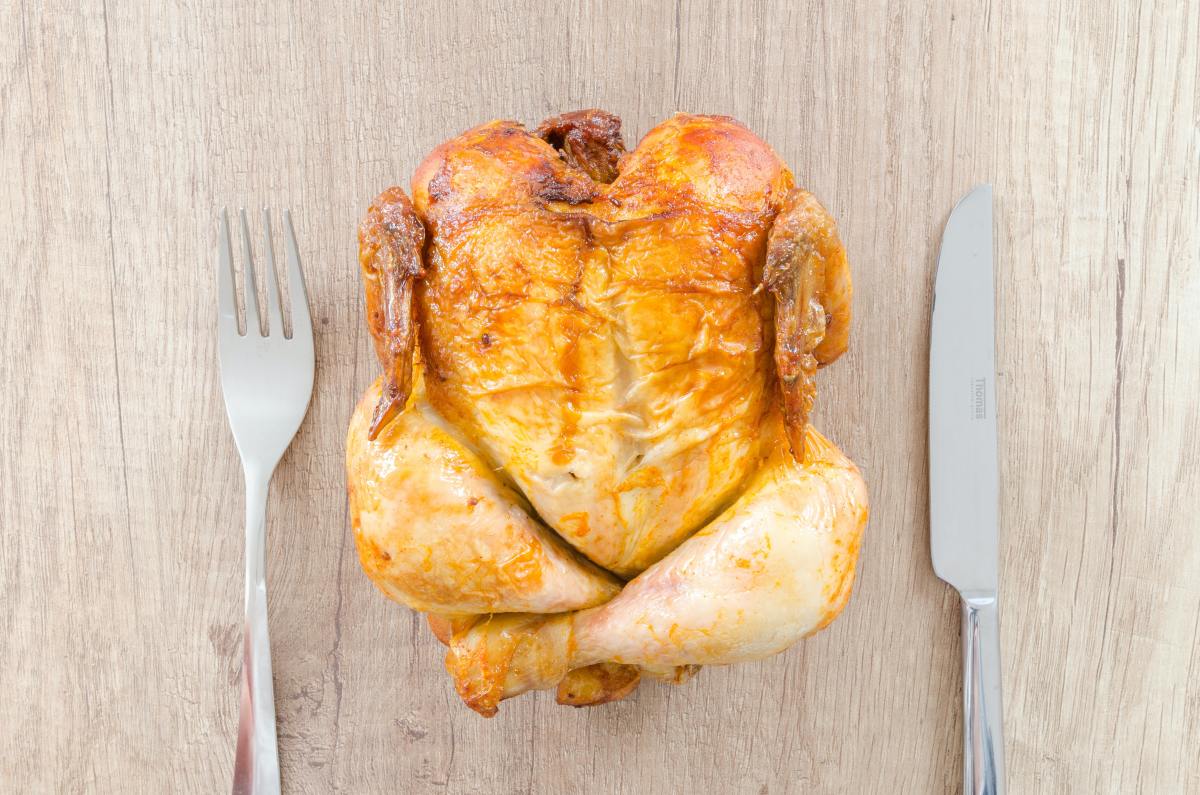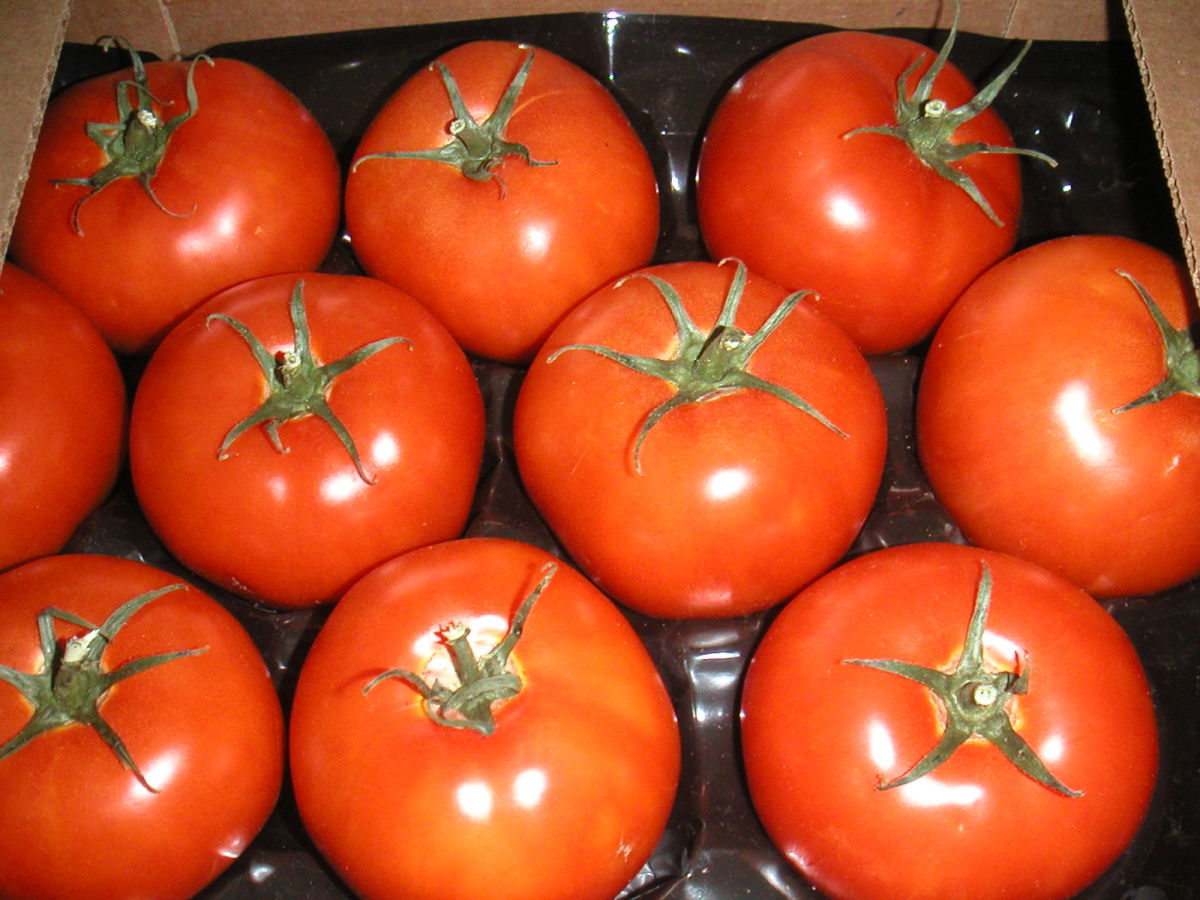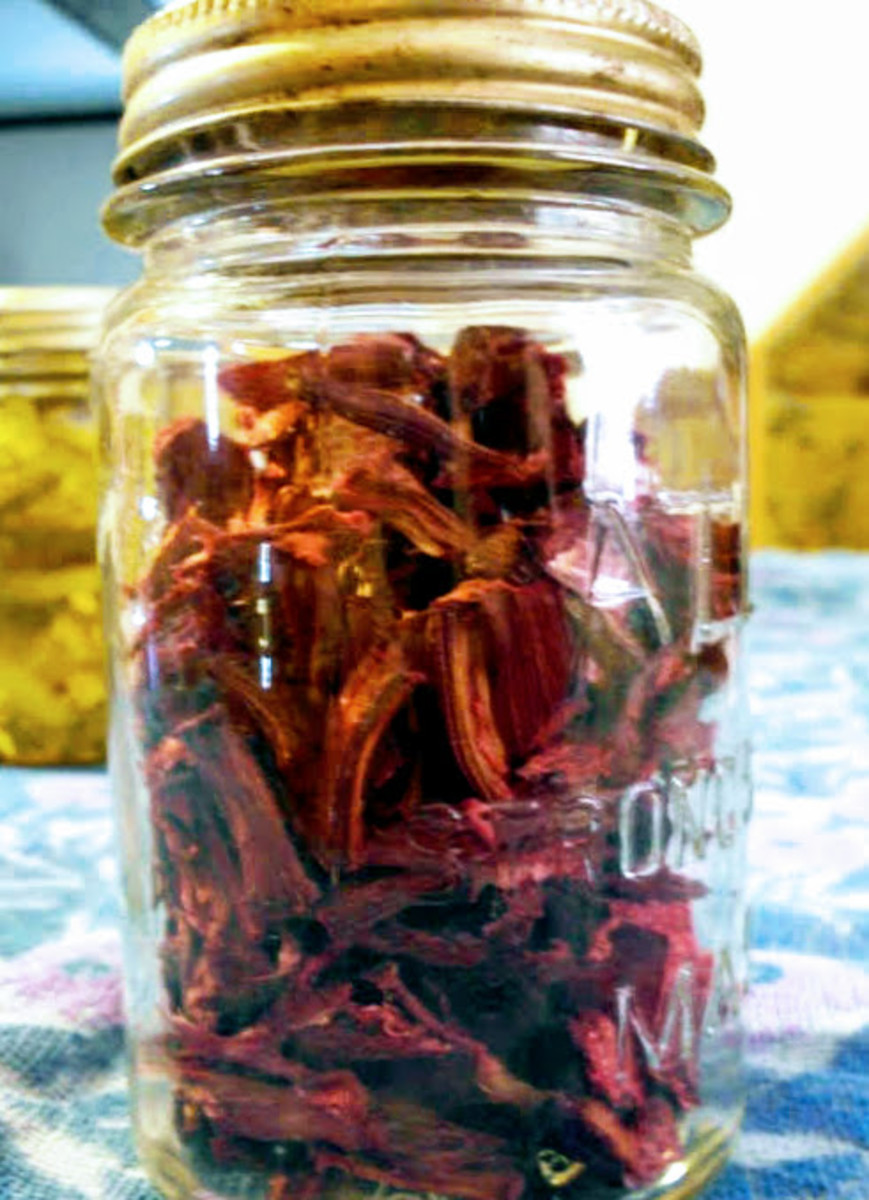Living Without Refrigeration
Living Off The Grid
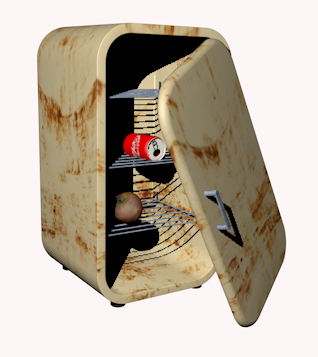
Living Without Refrigeration
Refrigeration, like the ability to produce ice at will, is a fairly recent event in human history so how did our ancestors keep food fresh and edible without these modern wonders? Believe it or not, it is possible and you are about to learn how to do it by using the same techniques that we have been using since the dawn of time. These techniques are perfect for homesteaders, liveaboards or anyone that just wants to live naturally and off the grid.
Historical Techniques For Keeping Food

Storing Food Without Electricity
Today we cannot remember a time when refrigeration did not exist and probably have never given much thought to how our ancestors were able to store food without such a modern convenience. Fortunately, some people have kept these practices and traditions alive until this day and I am going to pass them along to you. If you want to live off the grid, reduce your carbon footprint, become a homesteader or, like me, you simply live on a boat that has no refrigeration, these techniques will become invaluable to you.
Not Caning or Pickling
To be absolutely clear, I am not talking about preserving foods by using either the canning or pickling methods. While some people think that canning and pickling are the same thing, they are not. Canning is the processing of fruits or vegetables in jars in a special canner that heats the jars and the contents so that bacteria are killed. Pickling, on the other hand, is the process of putting veggies in a solution, usually salt, vinegar, sugar and spices to make them into a 'pickled' version of themselves e.g. pickles are actually cucumbers that have been put through this process.
I am not going to talk about either of these. I am going to teach you how to store food in such a way that it just lasts longer.
About Refrigeration
I think most of us know that, while fruits and vegetables don't need to be refrigerated, putting them in the fridge does retard the ripening process. However, what you might not have considered is that this is the exact opposite of what we usually want when we buy foods from our local grocery store. A good example of this is that tomatoes will quickly lose their taste of you keep them in a refrigerator.
Storing Eggs
Having grown up on a farm in rural Australia I know first hand that eggs will last a ling time without any refrigeration t all. How long? Weeks. So the obvious question that you are probably asking yourself is how do you know if the eggs are still OK to eat after weeks of sitting on the shelf? Well, there's a simple test that my grandmother taught me. Drop each egg into a glass of water and, the further it sinks, the fresher the egg is. If the egg floats, it is bad and you should throw it away.
According toabout.com, if an egg:
- Sinks to the bottom and stays there, it is about three to six days old.
- Sinks, but floats at an angle, it's more than a week old.
- Sinks, but then stands on end, it's about two weeks old.
- Floats, it's too old and should be discarded
Also remember to store eggs far away from things that may 'contaminate' them. Egg shells are porous and will absorb the flavors of the things around them so be careful what you store them next to or near.
Best Way To Store Potatoes
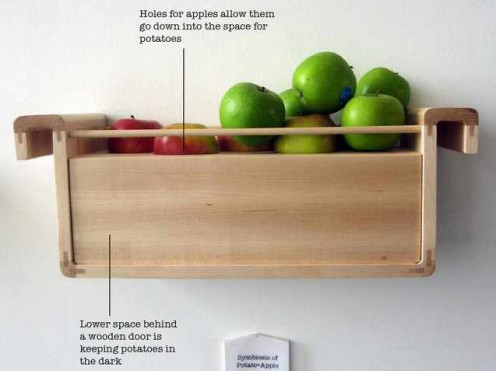
Storing Potatoes
It's pretty common knowledge that potatoes will last for a very long time, un-refrigerated, if you keep them in a cool, dark place but what is known only by a few is that you can also keep potatoes from sprouting if you store them under apples.
Why does storing potatoes underneath apples help to keep them fresh longer? Because apples, like many fruits, give off ethylene gas. That's why some people wrap their tomatoes in newspaper to speed up their ripening process, because it traps in their own ethylene gas. As a side not, this is exactly why keeping vegetables in a tray in your icebox is not a very good idea. It traps all of the ethylene gas inside!
Korean designer, Jihyun Ryou, has developed some very interesting storage designs to help us keep our food without relying on refrigeration. The photo to the right shows one of Ryou's designs where the potatoes are kept in the dark in the box underneath while the apples fit into holes in the shelf that allows them to vent their ethylene gas into the enclosed potato box.
Anisa, in her blog The Lazy Homesteader, has come up with her own, alternate way of storing potatoes and apples together by using a system of hanging baskets, one underneath the other. This is similar to a method that I use on my boat where I use a series of hung nets that swing freely.
How to tell if your potato is healthy: A fresh, healthy potato will have a smooth, even color. Remember to check for rot, damage, bug holes and never eat a green potato.
Storing Onions
Both bananas and apples can be used to prevent potatoes and onions from sprouting. Onions will keep for months if kept properly and yellow onions keep best of all. While you can store both potatoes and onions in cool, dark places, keep onions away from the spuds or they will absorb the potatoes moisture, drying them out.
Root Vegetable Storage
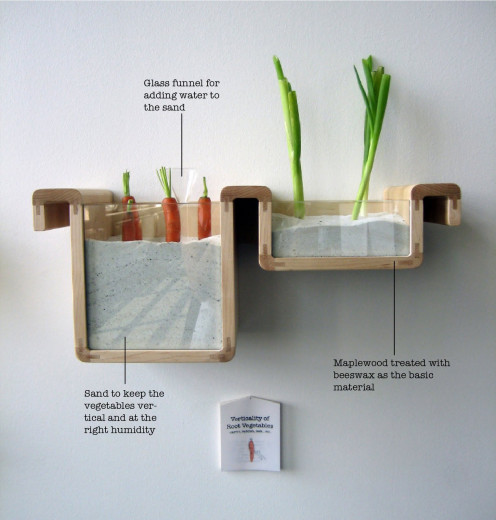
Storing Root Vegetables
Another design by Jihyun Ryou can be seen to the right where sand is used to store root vegetables in wet sand to help keep them at the right level of humidity.It is important to keep them vertical. This method of storing vegetables in slightly damp sand has been used by humans for hundreds of years because vegetables prefer low temperatures and high humidity.
Anisa reports that carrots, onions and celery keep very well this way. She also says that a head of lettuce that might appear to be past it's prime can be resurrected quite successfully by placing it in a sink full of cold water.
A Special Note About Storing Tomatoes
In Italy they keep a crop of tomatoes fresh for up to a whole year without refrigeration. How do they achieve this remarkable feat? By keeping them in a cool, shady, well ventilated place. They hand tomatoes from the ceiling to help dissipate the ethylene gas that they give off as they ripen. If possible, it is best to keep each tomato separate from the others for the same reason.
How To Store Fruit Vegetables
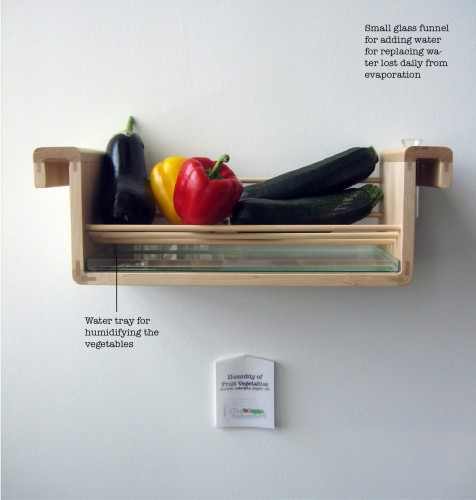
Storing Fruit Vegetables
Fruit vegetables like chili peppers, courgettes (zucchini), aubergines (eggplants) and require higher temperatures and will decay at an increased rate if kept in a refrigerator. The shelf to the right, again a design from Jihyun Ryou, is a great idea for how to store these kinds of vegetables to get the longest shelf life possible out of them.
EGGPLANT: Another tip for eggplants is to dip their stems in wax because this reduces the loss of moisture.
How To Keep Spices
Spices lose their flavor when exposed to direct sunlight so keep them in a cool, dark place. Also it is a smart idea to add a little rice to each spice or herb container to absorb any errant moisture and to keep the spices from drying out and clumping together.
Storing Citrus
Oranges & Lemons: Oranges & Lemons don't like cold temperatures and that includes storing them in the refrigerator. Kept in bowls, baskets or nets like I have on my boat, they will keep longer and get tastier as they mature and ripen. Their skins may become a little dry but their insides will be delicious.
Citrus fruits can also be kept in buckets of damp sand that are packed down slightly to ensure that the sand clogs up the pores in the fruits skin.
How To Store Eggs
This is an old cruiser's trick for storing eggs for long periods of time. Eggs, without any special treatment, will last on the shelf for several weeks at a time but, if you need to keep them for even longer, then try these two tricks:
1) Coat the shells in Vaseline. This seals up the very porous egg shells and prevent microscopic contaminants from getting in and causing the egg to spoil. Many boaters substitute mineral oil for Vaseline as it is something that many of us keep on board for cleaning our compass glass anyway.
DO NOT consume any eggs that smell bad when you crack them open!
2) Turn the eggs upside down every week to keep their yolks from settling on the bottom.
Storing Leafy Greens
Dark, leafy greens such as parsley and one of my all time favorite foods, the magnificent cilantro, are best kept like a bouquet of flowers, standing upright in a vase or glass of water. The water level should be below the height of the leaves and you should cut the stems fresh, just before you put them in the vase.
Storing Meat
According to lore, in in medieval Europe people used to keep meat stored by either packing it in salt and / or dried herbs such as basil or parsley before wrapping for storage.
Storing Butter Without Refrigeration
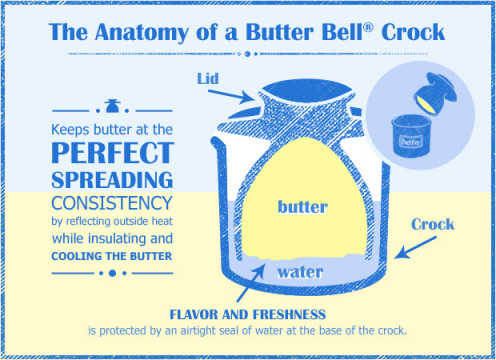
Storing Butter
Storing Butter without refrigeration just sounds like crazy talk but it is actually fairly easy to do using what is called a Butter Bell. The butter is kept in a container that is then turned upside down so that the water forms an airtight seal over the surface off the butter. The water needs to be replaced very regularly (i.e. daily) or it will quickly develop mold. The water should be a VERY salty brine and the butter bell should be kept in a cool, dark place.
Clarified Ghee
Clarified ghee (Indian butter for want of a better description) lasts for an extremely long time without refrigeration. Keep it in a cool place, out of direct sunlight and it will last for well over six months, even up to nine months.
Storing Lettuce
Lettuce can be kept for extended periods of time by keeping their roots i.e. the stem, in water.
Storing Brown Sugar
OK, this one I have to take on faith since I keep no sugar at all on my boat. According to reliable sources (I forget which ones), you can keep brown sugar and prevent it from going hard by storing it with an apple that has been cut in half.
Storing Fresh Bread
Freshly baked bread keeps for weeks and maybe even up to a month if you keep it in a wooden box. The box needs to be unvarnished, without any finish on it.
Storing Rice
Keeping a red chili pepper in with your rice will keep it bug free.
Storing Garlic
I use garlic in everything so being able to keep garlic fresh is very important to me. Garlic needs to be kept in a dry, cool environment out of direct sunlight. A paper bag works well if you leave the mouth open so that the garlic can vent. Invest in a garlic holder, it's worth it.
How to pick garlic: Look for firm bulbs with lots of dry, papery skin on the outside. Don't buy garlic that has shoots coming out of it. Like all produce, check for blemishes such as bruises, dark spots, soft spots or holes.
Best Way To Store Garlic
Foods That Create Ethylene Gas
Apples, apricots, avocados, ripening bananas, blueberries, cantaloupe, citrus fruit (not grapefruit), cranberries, figs, guavas, grapes, green onions, honeydew, ripe kiwi fruit, mangoes, melons, mushrooms, nectarines, okra, papayas, passion fruit, peaches, pears, peppers, persimmons, pineapple, plantains, plums, prunes, quinces, tomatoes and watermelon.
Foods Most Effected By Ethylene Gas
Asparagus, broccoli, Brussels sprouts, cabbage, carrots, cauliflower, chard, cucumbers, cut flowers, eggplant, endive, escarole, florist greens, green beans, kale, kiwi fruit, leafy greens, lettuce, parsley, peas, peppers, potatoes, potted plants, romaine lettuce spinach, squash, sweet potatoes, watercress and yams.


